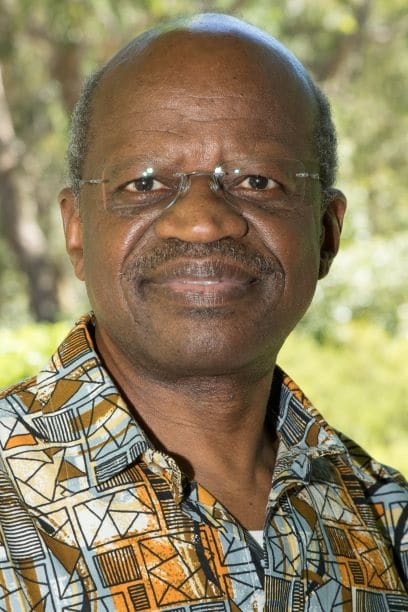“To ordinary people in Africa, a context marked (not only) by orality, what does copyright mean? The notion of copyright, a product of European romanticism, is a typical case of what Alan Watson (2001) has termed a colonial transplant. What does it mean in a context where intellectual production is governed by other norms?” asked Mamadou Diawara of the Department of Social and Cultural Anthropology at Goethe University, Frankfurt and Point Sud, the Centre for Research on Local Knowledge, Bamako, Mali.
“I’m aiming to confront the reality on the ground. Exploring copyright as it relates to popular culture in Africa.”

To confront this reality, Diawara draws on history and anthropology, field materials collected in Mali and Burkina Faso, as well as secondary sources from across the continent. His research is based on “deeply ethnographic history”. In his presentation he chronicled the story from the Kingdom of Ghana in the 4th to 11th centuries to post-colonial independence and the adoption of Western-inspired copyright laws in most African countries from the 1970s onwards.
“My inventory from the field – ethnographic investigation – shows that the legal transplantation does not work,” he said.
His particular interest is the neglected area of ‘intangible cultural goods’, because land law and law related to material culture has been already explored since colonial times.”
He described periods including the Kingdom of Ghana (4th – 11th centuries); the Mali Empire (13 – 16th centuries) and the Songhay Empire (14th – 16th centuries) when works were produced in the context of patron/client relationship between rulers and performers. Rulers employed chroniclers/historians who produced musical and poetic works chronicling their history.
“Poets and musicians produced long works – sometimes lasting up to ten hours,” he said. “But the works belonged to the ruler/patron, not the performer, and the people were entitled to access them.”
“During colonisation newly elected elites appropriated these chronicles and cultural goods. The historical norms became confronted with European – and later European-inspired – law during the colonial and post-colonial era.”
The fashion of copyright descended on Africa from the 1970s after the establishment of the World Intellectual Property Organisation in 1967 by the United Nations. “Where such historical texts belonged to the patron, not the performer, now international organisations changed this to the creators.”
It’s been the ‘Age of Law’ since 1978 when a copyright office was established in Mali operating according to Western paradigms. The period also saw the publication of a United Nations Development Programme report which promoted copyright as an agent for development. “The idea of culture as wealth was welcomed and celebrated especially as African economies were not doing well,” said Diawara. “Culture was seen as a product, something that could be exported. The idea was sold to African countries – Western countries were doing it, so why not us?”
“In the post-colonial world it became about cashing in to the highest bidders,” he continued. “Copyright was promoted to improve development to the benefit of local communities but, in reality, the new credo is faith in numbers – as if numbers alone can measure right and law.”
He explained that copyright became an attempt to submit cultural activities to the power of the market.
“Copyright often raises hope for enrichment – promises that are often quickly dismissed,” he said. “It’s an uphill battle. Those granted copyright are at risk of being prisoners – they claim it and want rid of it at the same time.”
He described it as a confrontation between the state which wants to take charge and protect art, and rights often based on personal relationships.
“Rules dictated by law cannot always govern personal relationships.”
Run faster than the pirates
Diawara also described the growth in counterfeiting, called piracy, which accompanied this pursuit of profit – an area that has grown exponentially with increased digitisation and social media.
“Pirating became as fashionable as protecting copyright. Competition rages between the counterfeiters and the authorities. They had to learn to sell the originals fast before the counterfeiter takes over. Some analysts see piracy as ordinary people resisting capitalism – young people usually take the risks and are arrested by the police.”
The state’s response to seize and destroy counterfeit goods is largely directed at the small not the big dealers.
“There is no way to seize what is at stake here – it’s much more complex and fluid.”
He explained the pressure on young artists who may wish to make their work available so that they become known.
He also explained the complexity of assigning copyright to collective cultural products including indigenous knowledge.
“Copyright is not able to capture the collective nature of performance or knowledge,” he said.
Such collective work is not always necessarily anonymous and assigning copyright loses sight of the cultural and historical values this work conveys. Copyright may effectively ‘confiscate’ local knowledge assigning a value to it and generating a market.
In discussion, Diawara addressed how producing art for the needs of the market profoundly influences the product. “Producing music that is market related and copyright dependent leads to new ways of production – it is cut and adapted in studios for the market taste. This happens globally. Music adapted to the taste of the urban population.”
He also commented on the effects of technology which can speed up counterfeiting but also block public access; academic plagiarism; and, restitution for expropriated cultural goods.
“Restitution is a complex area,’ he said. “Nations are very recent and borders are still contested so to project countries onto objects is crazy. Restitution is a diversion. It doesn’t solve the problem.”
Diawara believes his research has shown that the power issues related to cultural production cannot be reduced to supply and demand, and that Africa’s uniqueness resists imported legal solutions.
“Copyright is a huge issue for the African continent but it’s not the solution we need. We need to move beyond readymade solutions,” he said.
Michelle Galloway: Part-time media officer at STIAS
Photograph: Anton Jordaan
